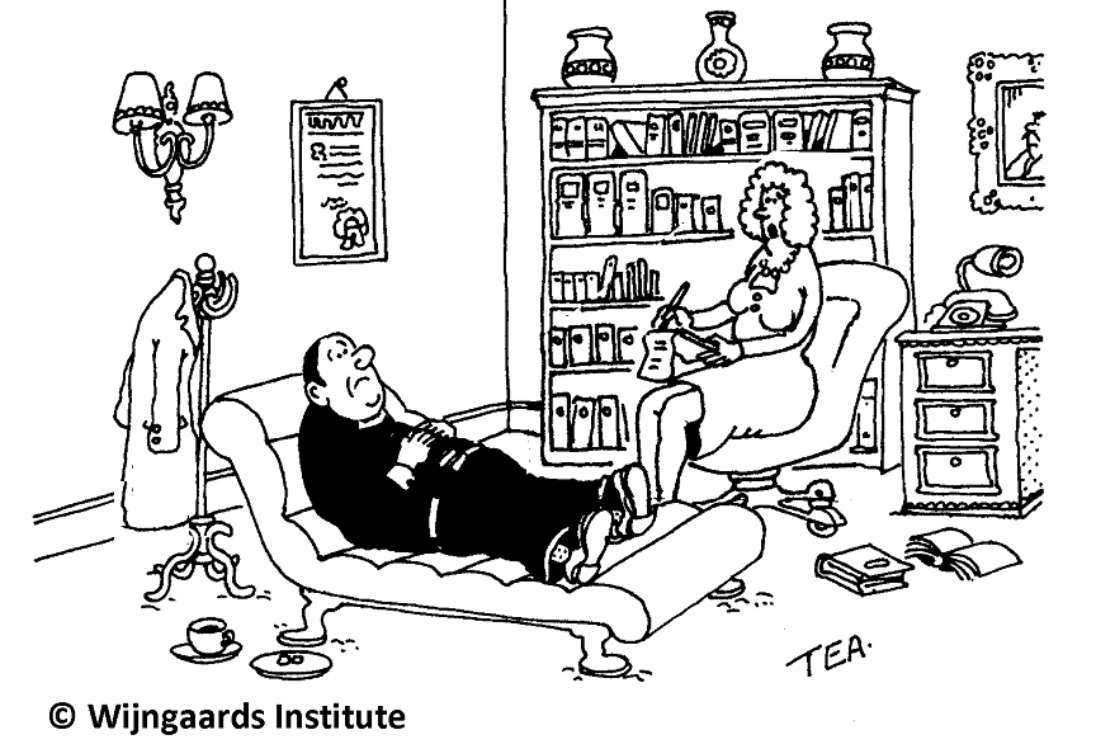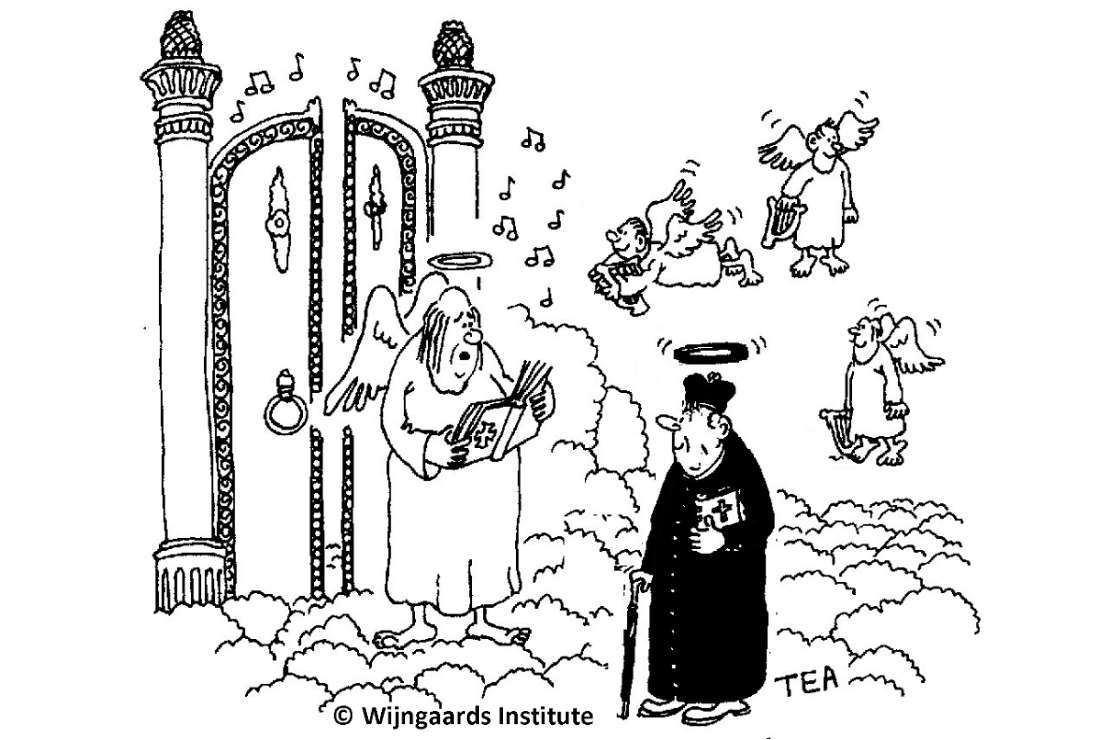The one thing Jesus never did was put himself on a pedestal, even though as the Son of God he could have done so

"What do you mean you've lost your divine status?" (Illustration: Tom Adcock)
“The teachers of the law and the pharisees love the best places at feasts and the reserved seats in the meeting houses. They love to be greeted with respect in the market places and have people call them “teacher.” You must not be called “teacher,” for you are all brothers and sisters of one another and have only one Teacher. And you must not call anyone here on earth “father” for you have only the one Father in heaven. Nor should you be called “leader” because your one and only leader is the Christ.” (Matthew 23,6-10)
You will not believe what I am going to tell you, but it happened. It was the 1960s in the Flemish part of Belgium.
A friend of mine was on the staff of a seminary for future priests. Now you must know that Catholics in Belgium, just as in the South of the Netherlands at the time, were very devout. They were committed churchgoers. They also had a very high regard for priests.
Most people were local farmers of small properties, not rich by any means. Stables for cows and pigs adjoined a farmer’s house, as well a primitive toilet. The home itself would have an upper floor with bedrooms, and downstairs a kitchen and daily living room. It also usually had, near the front door, a small specially decorated ‘upper’ reception room. It was there that a priest would be received during his visit, to keep him away from the smell of the stables and the latrine.
My friend, lecturer in the seminary, spoke about the sometimes exaggerated esteem for priests. And he gave me one example.
Some weeks previously a couple from a local farm had visited the seminary. They were the parents of one of the students.
“I showed them the various places in the seminary”, my friend said. “The chapel, the classrooms, the study room, the refectory, the recreation hall, etc. Then we came to the area with showers, latrines, toilets. The farmer had a good look round with some surprise on his face. Then he turned to me, shaking his head, and said: ‘Yes … Of course. Priests too need to go to the toilet’. As if he had not realised before that we priests too are human beings like everyone else.”
This may seem an extreme story. The truth is that in many countries priests have been put on a pedestal. One of the consequences has been that some candidates applied — and perhaps still apply — to become priests in order to achieve that higher status.
A privileged social class?
The Christian Middle Ages flourished as a feudalistic society. The community could roughly be divided into three groups: nobility, craftsmen and dependents, that meant often: slaves. People were considered to belong to one of these social statuses because they had been born into them. Or, to put it sociologically, they belonged to their status by ascription. A nobleman even though he was poor and dressed in rags, retained the respect due to a nobleman.
Owing to the prestige which the Church enjoyed in those centuries, the clergy were considered part of or parallel to the nobility. Most vocations would come from this group and becoming a priest or religious was not therefore considered a loss of status. A clergyman was respected simply because he was a clergyman, just as a nobleman was respected because he belonged to the nobility. This was also enshrined in church law.
The Church borrowed from the nobility many of the status symbols that now characterize the clergy. Canon Law enshrined customs that sought to underline the higher social status of the clergy. Examples are: the distinctive dress, the respectful form of address, the precedence to be given inside and outside of the church and the privilege of immunity.
Such status symbols were carefully graded according to hierarchical rank. A bishop was supposed to wear more purple than an ordinary monsignor. Whereas a bishop was called ‘My Lord’ (corresponding to the rank of a baron), an archbishop was addressed as ‘Your Grace’ (the title reserved to dukes) and a cardinal as ‘Your Eminence’.
Modern society has moved away from the concept of higher and lower classes among people. By law all persons are considered full-fledged citizens with equal rights and duties. Position in society is, at least theoretically, due to what one does and not to one’s family background. People are respected by virtue of their professions: surgeons, engineers, journalists, lawyers or ministers of state. In contrast, the Church has clung, in practice, to defending a higher status for clerics.
What did Christ think about this?
At the time of Christ, the scribes and pharisees considered themselves a class apart. They looked down on the ordinary people whom they called “am ha-ares,” that is, “the people of the land.” Rabbinical writings have preserved instances of real contempt. “A man should be ready to sell all he possesses to marry the daughter of a scribe. He should never take a daughter of the common folk, for these are contemptible and their daughters an abomination.” Scribes were not expected to mingle with such people even in every-day life. “A pharisee should not enter a house of the common folk as a guest, neither give them hospitality as their host.”
In this way, scribes and pharisees claimed for themselves a higher dignity, a greater interior worth, a superior social standing and even a greater sanctity in the eyes of God.
This was the situation that Jesus criticized. He did not condemn only the individual pride of some scribes and pharisees, but their whole attitude as a group. As a class, they insisted on precedence both in the synagogues and at social functions. As a class they wanted to be recognized and acclaimed whenever they appeared in public. As a class, they had reserved some titles for themselves that other people were not allowed to use. To bring out the higher dignity which they thought they possessed, they put themselves on a pedestal.
Christ did not want his future ministers to form a similar higher-status group. “For you are all brothers and sisters of one another”. “For you have only one Father who is in heaven”. “Because your one and only leader is the Christ” (Matthew 23,6-10).
In his own behavior Jesus himself lived up to the principle of accepting a common dignity for all people. When he was born, he was put in a manger as any other child of the ordinary people would have been in the same circumstances (Luke 2,6). Those invited to celebrate his birth were common shepherds (Luke 2,7-8). Jesus spent his early life in the very hum-drum hamlet called Nazareth (John 1,36). He was known as ‘the carpenter’s son’ and his mother and relations were considered people like anybody else (Matthew 13,55-56). The pharisees were scandalized because Jesus moved freely with ‘tax collectors and outcasts (Matthew 9,11).The one thing Jesus never did was putting himself on a pedestal, even though as the Son of God he could have done so.
Questions
- The Church in our day has reaffirmed the essentially equal dignity of all its members. Have we really absorbed the full implications of this?
“There is in Christ and in the Church no inequality on the basis of race or nationality, social condition or sex... And, if by the will of Christ, some are made teachers, dispensers of ministries, and shepherds on behalf of others, yet all share a true equality with regard to the dignity and to activity common to all the faithful for the bearing up of the body of Christ” (Vatican II, The Church, no 32).
- If we think that a loss of social status necessarily implies a loss of authority, could it not be that we have misunderstood the kind of authority Jesus is thinking about? If Jesus’ authority did not involve the claim to a higher status, why do we think leadership in the church profits by it?
Published by arrangement with the Wijngaards Institute for Catholic Research
*The views expressed in this article are those of the author and do not necessarily reflect the official editorial position of UCA News.










